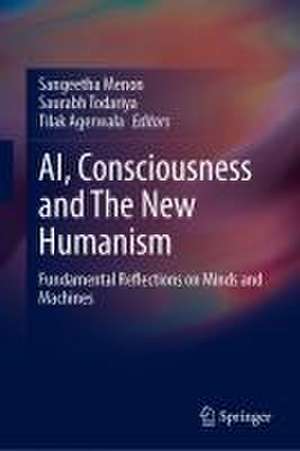AI, Consciousness and The New Humanism: Fundamental Reflections on Minds and Machines
Editat de Sangeetha Menon, Saurabh Todariya, Tilak Agerwalaen Limba Engleză Hardback – 21 mar 2024
Preț: 735.84 lei
Preț vechi: 897.36 lei
-18% Nou
Puncte Express: 1104
Preț estimativ în valută:
140.82€ • 146.12$ • 117.70£
140.82€ • 146.12$ • 117.70£
Carte tipărită la comandă
Livrare economică 17-31 martie
Preluare comenzi: 021 569.72.76
Specificații
ISBN-13: 9789819705023
ISBN-10: 9819705029
Ilustrații: VII, 349 p. 28 illus., 22 illus. in color.
Dimensiuni: 155 x 235 mm
Greutate: 0.68 kg
Ediția:2024
Editura: Springer Nature Singapore
Colecția Springer
Locul publicării:Singapore, Singapore
ISBN-10: 9819705029
Ilustrații: VII, 349 p. 28 illus., 22 illus. in color.
Dimensiuni: 155 x 235 mm
Greutate: 0.68 kg
Ediția:2024
Editura: Springer Nature Singapore
Colecția Springer
Locul publicării:Singapore, Singapore
Cuprins
Chapter 1: Introduction.- Chapter 2: What AI can learn from the Brain – The Temporal Augmenting Agent (TAA).- Chapter 3: Can Machines Learn Music? An open dialogue between Neuromusicology and Computational modelling methods.- Chapter 4: Can Machines ‘Think’? Machine intelligence and the phenomenal nature of thoughts.- Chapter 5: Can Machines Think Causally?.- Chapter 6: Neuromodulation and AI.- Chapter 7: Self-awareness and its implications for cooperative - competitive machine-mind interactions.- Chapter 8: Bicentennial Saga of Consciousness: Exploring the Lives and Minds of Humans and Machines with a Discussion on contemporary Sci-Fi Movies that Straddles the Identity, Love and Intelligence Discourses.- Chapter 9: AI as an Intercultural Trigger of New Consciousness.- Chapter 10: Can Artificial Intelligence (AI) accelerate social advancement? A review of possibilities and challenges.- Chapter 11: Mind-reading machines: Promises, Pitfalls and Solutions of Implementing Machine Learning in Mental Health.- Chapter 12: AI Technology and Autonomous Weapon System: Debating “Meaningful Human Control”.- Chapter 13: Language and Meaning in Humans and AI Systems.- Chapter 15: Artificial Intelligence (AI), Machine Learning (ML), and the Humanities.- Chapter 16: Expanding Cognition: The Plasticity of Thought.- Chapter 17: Simulation and Obfuscation: Artificial Intelligence, Intelligent and Not?.- Chapter 18: Can Artificially Intelligent Machines have a Goal?: An Understanding based on Bhoja's Aesthetic Theory of Character Personality and Life-goals.- Chapter 19: Incomplete performitivity in the age of Neganthropocene or how to exit the Anthropocene.- Chapter 20: Singularity Beyond Silicon Valley: The Transmission of AI Values in a Global Context.- Chapter 21: Advaita Ethics and the Machine Age: The Pursuit of Happiness in an Interconnected world.- Chapter 22: The World as Affordances: Phenomenology and Embodiment in AI.- Chapter 22: Human Learning andMachine Learning: Unfolding from Creativity Perspective.- Chapter 23: On Convergence of Intelligence: Decision-making Models in AI and Reflections on Human Intelligence.- Chapter 24: Situating AI in the matrix of human agency and normativity: Implications of post-phenomenological mediation and technological intentionality.- Chapter 25: Investigating the ontology of AI vis-a-vis Technical Artefacts.
Notă biografică
Sangeetha Menon is Dean School of Humanities and Head of the Consciousness Studies Programme at the National Institute of Advanced Studies, Bangalore, India. Her research and publications explores the interconnected layers of human experiences in the context of wellbeing and life-purposes.
Saurabh Todariya is Assistant Professor, Human Sciences Research Group, International Institute of Information Technology, Hyderabad,
Tilak Agerwala is Adjunct Associate Professor, Seidenberg School of Computer and Information Systems, Pace University, New York, and Adjunct Professor, at the National Institute of Advanced Studies, Bangalore, India. He retired from IBM in November 2014 after 35 years of service.
Textul de pe ultima copertă
This edited volume presents perspectives from computer science, information theory, neuroscience and brain imaging, aesthetics, social sciences, psychiatry, and philosophy to answer frontier questions related to artificial intelligence and human experience. Can a machine think, believe, aspire and be purposeful as a human? What is the place in the machine world for hope, meaning and transformative enlightenment that inspires human existence? How, or are, the minds of machines different from that of humans and other species? These questions are responded to along with questions in the intersection of health, intelligence and the brain. It highlights the place of consciousness by attempting to respond to questions with the help of fundamental reflections on human existence, its life-purposes and machine intelligence. The volume is a must-read for interdisciplinary and multidisciplinary researchers in humanities and social sciences and philosophy of science who wish to understand the future of AI and society.
Caracteristici
Enriches understanding of cutting edge questions on AI and society Presents leading expertise from diverse humanities and scientific communities around the world Offers fundamental reflections on questions from humanities, social sciences, brain studies and philosophy on AI
